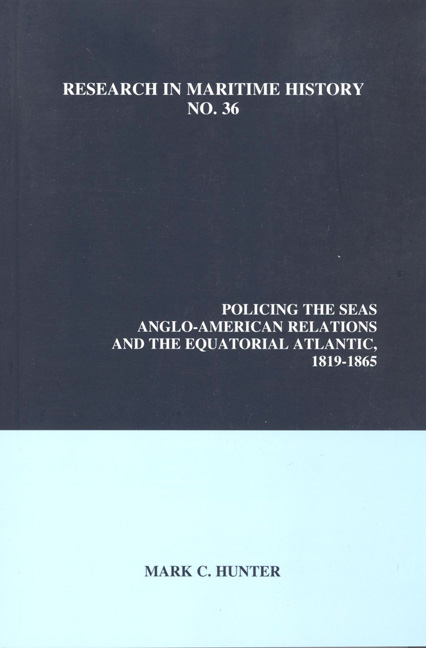Book contents
- Frontmatter
- Contents
- List of Tables
- List of Illustrations
- About the Author
- Acknowledgements
- Chapter 1 Introduction
- Chapter 2 The Atlantic
- Chapter 3 Anglo-American Policymaking, 1819-1834
- Chapter 4 Naval Relations and the Suppression of Piracy and Slaving, 1820-1830
- Chapter 5 A Naval Compromise, 1830-1842
- Chapter 6 The Royal Navy and West Africa, 1843-1857
- Chapter 7 The US Navy and West Africa, 1843-1857
- Chapter 8 Conflict Avoidance in the Equatorial Atlantic
- Chapter 9 The Civil War and Conflict Resolution in the Equatorial Atlantic
- Select Bibliography
Chapter 3 - Anglo-American Policymaking, 1819-1834
- Frontmatter
- Contents
- List of Tables
- List of Illustrations
- About the Author
- Acknowledgements
- Chapter 1 Introduction
- Chapter 2 The Atlantic
- Chapter 3 Anglo-American Policymaking, 1819-1834
- Chapter 4 Naval Relations and the Suppression of Piracy and Slaving, 1820-1830
- Chapter 5 A Naval Compromise, 1830-1842
- Chapter 6 The Royal Navy and West Africa, 1843-1857
- Chapter 7 The US Navy and West Africa, 1843-1857
- Chapter 8 Conflict Avoidance in the Equatorial Atlantic
- Chapter 9 The Civil War and Conflict Resolution in the Equatorial Atlantic
- Select Bibliography
Summary
British efforts to enlist American cooperation to suppress the slave trade originated in the war against piracy in the Gulf of Mexico in the 1820s. During that decade a consensus developed in the US to use sea power to protect trade from attack but left activities in West Africa largely to a private colonization society. Similarly, the British believed in diplomatic manoeuvres to achieve objectives in Latin America. Until Britain achieved its policy goals, London worked to protect commerce but softened its use of sea power for fear it would spark a conflict. Britain sought diplomatic cooperation with the US but remained suspicious that Washington wanted to seize Cuba. Nevertheless, London accepted American positions, such as the Monroe Doctrine, when they helped to further the larger British goal of warning off other European powers while securing access to Latin American markets. In the Gulf of Mexico, Britain and the US used their navies for commerce protection while leaving market access and expansion to diplomats. But they also began to use sea power to further long-term goals without resorting to war over their differences.
The Enlightenment ideas of free labour and support for the abolition of slavery were widespread in Britain. But the US clung to the slave system, and many Americans feared the consequences of African-American freedom. As a result, the status of the slave trade caused tension in Anglo-American relations as each pursued different policies. But Britain and America moved to reconcile their differences so that they could use sea power to further long-term goals in the equatorial Atlantic while reducing tension. The White House hoped to placate British demands to suppress US involvement in the slave trade but only took actions that were domestically acceptable, like dispatching single ships to the West African coast and providing limited support for colonization efforts to repatriate freed American slaves. In response, Britain decided to await the results rather than push for further action. The role of sea power in the equatorial Atlantic became a mechanism through which Britain and the US could resolve their disputes peacefully within the confines of their individual domestic and international interests.
British Policy and the Gulf of Mexico
In the wake of the European wars, the British believed that the use of sea power was a legitimate way to provide trade protection but left market access to merchants and diplomats.
- Type
- Chapter
- Information
- Policing the SeasAnglo-American Relations and the Equatorial Atlantic, 1819-1865, pp. 49 - 72Publisher: Liverpool University PressPrint publication year: 2008



